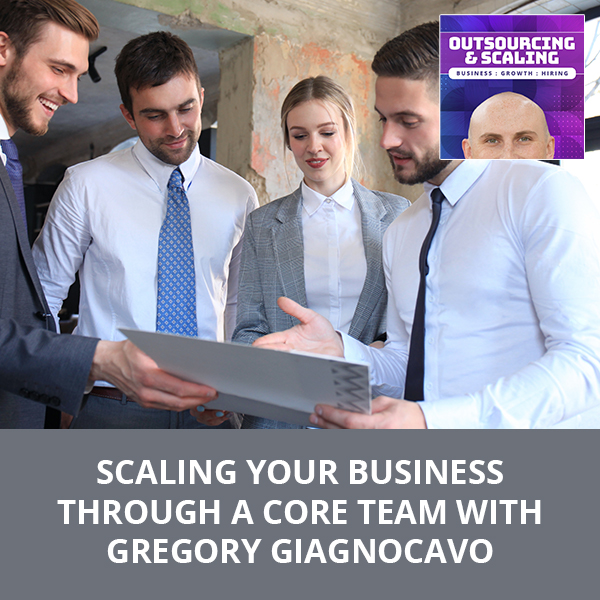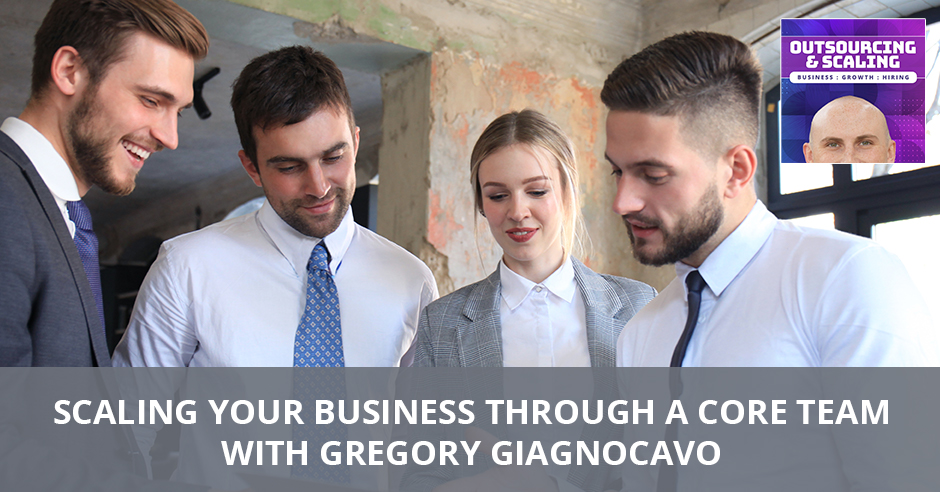


A core team can be the foundation of a major business because this is where loyalty and trust stem from. Gregory Giagnocavo is an entrepreneur who loves buying businesses, scaling them within 30 months, selling them when it gets too big, and starting something new. With his method of doing business, Gregory believes that regardless of the entrepreneurial process you go through, one must have that core team as a foundation. He points out what we should look for in a team and adds shares insights as to how he goes about the vetting process. Learn more nuggets on growing a company and hiring and developing people as Gregory dives into how he has developed his businesses.
—
Listen to the podcast here:
[smart_track_player url=”https://www.podetize.com/statsapi/www.podetize.com/wp-content/uploads/fileuploads/11-5b145ef137b51b3d1af0633e9305c43d/10/2019/083df784411b0b948c5bf17867a7bf78.mp3″ title=”Scaling Your Business Through A Core Team with Gregory Giagnocavo” artist=”Nathan Hirsch” image=”https://freeup.net/wp-content/uploads/2019/04/OAS.png” ]
Download the audio file here.
Scaling Your Business Through A Core Team with Gregory Giagnocavo
My guest is Gregory Giagnocavo. We’re super excited to have you on. I know you’re a long time entrepreneur and you’ve never had a real job. When you were 24, you partnered with a small accounting firm in Toronto. You started putting together a few investors to develop real estate in Florida, which is where I live. That turned into a commercial real estate development company with twelve contractors, developing shopping centers and office buildings. You borrowed $15 million and built eleven projects in six years. In 1992, you discovered the internet when there were only 50 websites worldwide.
Our local publisher bought one of the books and you met him by accident. Based on that book, he lent you $1 million to start an internet educational publishing company. That became the largest of its type in the US. You also build an educational conference which became huge. You sold that company for $14 million. You are buying business and scaling them within 30 months. When it gets too big, you sell them off and start something new. I want to talk about all of that but let’s take a gigantic step back. Talk to me about what you were like growing up. Did you always know that you want to be an entrepreneur? Were you a good student in school? Were you a rebel?
I became an entrepreneur out of self-defense. My father had a scrappy childhood. He grew up in a children’s home. It’s a terrible story. He didn’t know how to deal with children. We are seven, I have six brothers and sisters. I started working when I was seven, building cans with kerosene and perfume to make fly spray. You had to suck it with a hose to get it started. My mother was mad at him for that. When I was eleven, I started working steadily and it wasn’t good. I became suicidal at the age of thirteen to fifteen. I didn’t know if I was going to make it to age sixteen. By the time I was sixteen, I had this dream. In this dream, I have a business, houses, cars and a beautiful wife. All these things that I saw, all of a sudden changed my outlook and mindset. I knew and said, “Hang in there for a few more years. It’s going to be okay and you’re going to have great ideas. That’s how I kept myself going.”
I think the average entrepreneur, they start a business and get stuck inside their business. It’s tough for them to sell and let go of their baby and to move on to bigger and better things. It almost seems that you’ve removed that emotional attachment. You’re all about growing it, getting rid of it, and starting another business. Talk a little bit about your mindset that goes into that.
There are many different ways to grow a business as many successful people own a business. Especially in the East Coast, they own a business for 60 to 70 years, since from a hundred years ago. That’s cool but that’s not my style. Some people say, “Are you sure you’re not ADD? You get something started and when the thrill wears off, you move on to a different company.” Most of my contractors start on a folding table or on my dining room table. I start them with me. I get one other person and we get it going. That’s the exciting part to me although that’s hard for many people. For many people, the first year is so hard. You hear them talk about it, “Hang in there. You’ve got to keep going even if it’s tough.” I respect that. That partly is true but that’s the part I excel at. That’s what I’m good at and that’s where I get a thrill from. When you get 60 to 70 contractors and lots of money rolling in, you start to naturally get suitors. They start to offer you a lot of money. You start to think about it and then you cash out. You take the money and take two to three years off with the family, travel, do something differently.
You get itchy in another couple of years so you start another one. I took off seven years after one of them. I took off a few years and then I started noticing trends. I look around and go, “What’s the next big thing that not everybody recognizes yet?” I get into that and I scrap and build around it. By the time that everybody’s into it, let’s say 30 months later, a lot of large companies are large because they acquire smaller companies. I like to be the little fish that the big fish gobbles up. They always pay a premium. A lot of small entrepreneurs don’t realize that. If you get your company towards scaling, you don’t have to worry so much about the short-term profit. Once you have a lot going on, a big company will buy that going on. They’ll buy that energy and momentum. That’s what I capitalized on.
If you want to get the company that you want to sell or scale, you’ve got to build the foundation.
Let’s talk about that first year. What do you think you’re doing differently in that first year than the average entrepreneur?
In the first year, you have to decide what kind of company you are going to build. If you want to build a lifestyle company where you make enough and make 20% more to cover up for things that might go wrong, that’s fine. You might make a couple hundred thousand a year and totally be satisfied with that if you know that’s the company that you want to build. That’s different than what I like to do or what many people like to do. They’ll say, “We’re going to the moon, but first we have to clear the weeds off to this land.” When I’m clearing the weeds, I’m still thinking that we’re going to build something that’s going to go to the moon. When someone else says, “Once we get these weeds done, we could build a nice three-bedroom cottage here.” That’s okay. I don’t build three-bedroom cottages. I’m going to go build a skyscraper. I’m going to go to the moon.
Everything I do early on, keep in mind if you want to get the company that you want to sell or scale, you’ve got to build the foundation. It’s boring. You go past a site where they’re building a big building. For a long time, you can’t see what’s going on there. There’s a big fence up with a little hole in it. They’re going on for months because they’re building a big building. If they were building a big building, you have to take that account into account early on and lay a foundation. That means paying a lot of attention with your early contractors, partners or teams. It’s critical to build core team that can stick with you for a long term because if you don’t have time to change core team when you start to grow rapidly.
What do you look for in a core team?
Technical skills are important. First, you need someone that compliments you. I don’t need another “me”, one of me is enough. In my case, I’m not a programmer so I need programmers. I need a technical person usually, so I get a technical person. For construction and real estate development, I got a guy who is familiar with construction itself. You build your technical core team which is only going to be about three to five people. That’s it. If you’re going to talk about having founders, then you don’t want more than three founders. Most large companies have never got large if they have more than three founders. The ideal is two to three founders to compliment you. If you’re a great salesperson, I know you like to hang around sales and energetic people, but you don’t need two more of those.
You need a technical person and detail person. If you look at my first four or five people in the company, they’re all different skill sets. You see those guys in a parachute, they’re all holding hands after they jump out of the plane. That’s a great look for me. That’s the kind of team I want to build first. A core team that has all the bases covered. After that, as you add more people, there are a lot of dynamics you want to consider. If those third-tier level people that you hire, as you go along by month 6 or 7, if you lose one of those, you can replace them. You need to keep that in mind as you build. The first core team, you need to count on those people because you cannot replace those for at least eighteen months.

We’re talking about managing these people. As you grow, you get bigger and you add a few more people. Are you having weekly meetings or you chat? Do you talk to them daily? Do they work in the same place or are they remote? Talk to me about managing that.
The core team is similar to when you draw concentric circles, like a bullseye. It doesn’t mean that they’re more valuable. You have to be careful that you don’t have a favorite child. Like in my family, there are five or six kids all together. The four with the one daughter, the boys always felt that favored her and I did. Fathers do that sometimes with one child. Be careful not to do that. They’re core team because of their skillset. You have to not favor them. Amongst them, you can praise them or everything. On the concentric circle, when you get the next six people that you hire, you can‘t play favorites. I’m conscious of that.
We have the daily meetings with the core team, even if it’s a quick meeting. This is before we had Zoom. We’d touch base and we’d all be together physically. We would touch base every day. You might call it agile programming or something like that where you touch base every day and catch up the next day. “What did not go right?” “Make sure it’s in today’s schedule if it wasn’t done yesterday.” I did that stuff naturally. Also, I look for self-starters not somebody who’s a renegade. I don’t need renegades. I appreciate renegades but I don’t want another person like me. I want someone that can get tune with the plan and stick with the plan. Give suggestions, I always encourage that. We have a mission. We’re going to bolt this together and you can’t redesign it as we go along.
A core team is somebody who is loyal to me. I’ll be loyal to them and I have to build those dynamics. You can find a smart programmer but if they have a bad attitude, it’s not going to work with the core members. You need to spend time getting that core team. As we add on to that, we look for things that are going to need for growth. In my core team, I’m looking for someone that can handle growth. I might not even have a salesperson because I can handle sales. Once I get the core and that foundation built and that’s rising above the ground, now you’re handling public relations, press releases. You’re starting to do sales and presales of the condos if that’s what you’re doing. Start adding these people in that can add energy and sales and meat on the bones that you’re building.
Talk to me about vetting people. Let’s say you are a salesperson. You don’t want to add another salesperson. You want to add someone technical. How do you go about vetting someone if you’re not a technical person?
What entrepreneurs sometimes fail to do is recognize that what you start with isn’t what you need to build with. Later on, you will say, “What got you here won’t get you there.” At the beginning, you might hire someone that’s a friend, someone that you worked with in another company or knew from another company. At first, you can wing it because of lot of personalities are necessary to the core team. That does not work when you start to add on, you start to add a couple of contractors a month. What I look for in that case is a team fit. I met a guy who was a fantastic sales guy and we hired him. After five weeks of feeling good we hired him, we had to fire him. He was so arrogant. He didn’t work with the team members. He was respectful to me. I started getting complaints from other team members and everybody else. You need to watch that. You might have to admit to yourself that sometimes you’re going to make mistakes.
What entrepreneurs sometimes fail to do is recognize that what you start with isn’t what you need to build with.
I’m big on using assessment tests. There are three assessment tests that I like and use them. Early on, I made a mistake in the decision, more or less myself maybe asking another core team person. I don’t do that now. I make sure that the new hire that I’m going to work with have a separate interview without me there and go through the interview process. We tend to wing it as entrepreneurs. It’s important to write down exactly what you’re looking for, what you expect that person to do and how do you expect them to interact with the rest of the team. Once you have a clear template for that, it cuts down 50% of your hiring mistakes. That’s an error when entrepreneurs wing it for a while. You can’t wing it because you’re playing with other people’s lives. I hire someone I like, sent him down the hall and set him up in his office and find out nobody else likes him. It’s important to have likeability factor as well.
Most of your hiring is old fashioned. Back then, you said that you don’t have Zoom. You’re hiring people in person. Are you still doing that or you have you moved to the remote, to using virtual assistants in the Philippines or freelancers? Are you still sticking with US people in person?
With the companies that we have, we have people that are remote, but we met them in person first. It might be time to do that, but we don’t have anybody remote like in the Philippines or in a third country. We keep them and we train them. In some cases, if you’re doing government work, you can’t have non-Americans, non-citizens working on a project. They won’t let you log in. In telecom, we keep it close to the States. It’s the regulation. As a lot of technical training is ongoing, we want to be able to have them to hop on a plane and be there in 2.5 hours. It helps build the team. In working remotely, I did have a programming that was in another country. I happen to know the guys personally, but they were still in another country. We hired some people that were from that country as well.
It’s important to have people feel that they’re part of the core team. I feel that that for every virtual assistant, we almost want to meet them in person if you can arrange that. I have them fly up every few months. We have a couple of days to light work together, going out having some meals together with the rest of the team. We wanted everybody to feel like a core part of the family. Even now, we do that. We have weekly meetings by video conference where they can ask questions, you’ll feel like you’re virtually there. It doesn’t seem to replace the fact that you fly them in every three months or more than three times a year. They sit down, “Pass the ketchup.” You tell some jokes, hang out, and build a team feeling.
Talk to me about selling business. That’s the goal of a lot of entrepreneurs. They want to sneak peek into that process. What should they be aware? What should they look out for? Can you talk about that a little bit?
There are three phases of a company that I don’t think we appreciate enough. There’s a launching phase which we get all excited about, it’s called a startup. There’s the growth phase and scaling phase. Outside companies or investors, they like to buy things that have been proven to scale. That’s different than growth. It takes some time and thinking to understand the difference. While you’re excited that you’re starting up something, then listen. If you’re in Silicon Valley, a lot of startups are sold before they even get rolling very well. That’s not the norm. The norm is you have to work hard to get it launched, you have to work hard to get growth. You almost have to re-engineer yourself to do scaling. Growth is getting more sales. We’re growing, we’re making more sales.

Scaling is different. This is what turns on buyers. Probably nobody ever used the slide rule, but on these medical scales, they’ll adjust the top thing. That will say that for every notch below, it’s now worth 5. Move the notch at the top and everything below is worth twenty. That’s scaling. Every time you do something, you get much more return from it. It works when you look at something like subscription services or cloud services. Once you put the number of x dollars to put everything in place, it doesn’t take much extra expense or overhead to add another $100 or $10,000 in revenue. That’s what companies are looking for. They’ll give you a premium from doing all that hard work from your kitchen table to the five-core people, to hiring 20, hiring 70. They want to buy something that they can actually get rid of those core people because they already have them. They’re buying your scaling power. You need to get to a stage where you’re scaling and adding a lot more revenue a lot more quickly with a lot less expense per revenue dollar that’s coming in. That’s what companies want. That’s when people have approached us.
If nobody’s approaching you but you’d like to sell, you need to audit your system to make sure that you withstand a lot of criticism. If you want to sell something, it’s wise to start checking out your competitors and what software they use or what style they use. When someone buys companies, they’re looking for ease for acquisitions, ease of onboarding. If you’re using some homemade software that nobody else is using or something odd that you patched together and everybody else in the company is using X, Y, Z software, it behooves you to move to X, Y, Z software. When the buyer comes along, your technology is checking off the box. Look at what you have going on. How do you run your company compared to how other people run it? If you try to have more similarities, the purchaser will give you a lot of credit for that. They won’t dig deep into that. Otherwise they’re going to discount you and say, “It’s going to cost us $300,000 to move into your software,” so they’re going to dock you for $600, 000.
Thank you so much, Gregory. Where can people can find out more about you and what are you most excited about?
I’m on the Social Strategy Academy, StrategyAcademy.net. I’m on Facebook, that’s the best way @Gregory.Giognacavo. I’m on LinkedIn @GregoryGiagnocavo. I’m focusing on selling one of the companies. It’s a big deal, so it takes a lot of your brain cycles to do that. Sometimes it takes more than a year to sell these things. I’m packaging some of my knowledge into niches. I’m looking to get my course in my membership site going. That way, I can scale what I already know instead of doing one-to-one coaching as I help companies figure out how to go from growth to scaling. That’s what I’m doing now.
Thank you so much for coming on.
Thank you, Nathan. By the way, total respect to your company. I love the way you’re scaling and growing. It’s very impressive.
I appreciate it.
Important Links:
About Gregory Giagnocavo
 Gregory Giagnocavo never had a formal job, always involved in entrepreneurial ventures.
Gregory Giagnocavo never had a formal job, always involved in entrepreneurial ventures.
Age 24, he was a partner in a small accounting firm in Toronto. Started putting together a few investors to develop real estate in Florida.
That turned into a commercial real A state developing company with 12 employees developing shopping centers and office buildings. Borrowed $50 million and built 11 projects in 6 years.
He discovered the Internet in 1992 when there were only 50 websites worldwide. And they were text-based, not graphical.
A local publisher actually bought one of the books and I met him by accident. And based on that book he lent me $1 million to start an Internet education publishing company.
That became the largest of its type in the United States, and we also built an educational conference that became huge. We sold that company in 30 months for $14 million.
Because there was no ISP where we lived, I started an Internet service provider that went public and later got sold to Earthlink.
I have started several telecom companies some were sold and one I still own part of.
